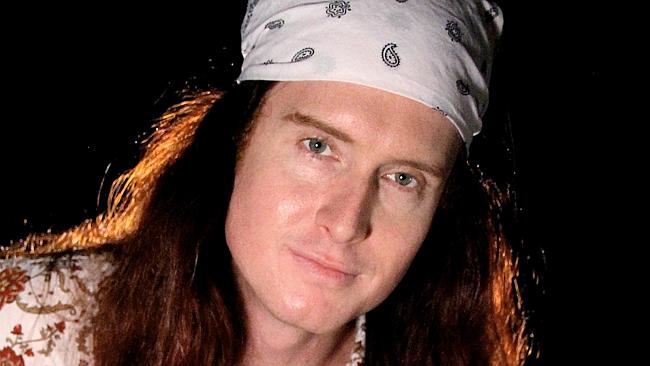Taking the boy out of FNQ, into Nashville

8 Ball Aitken is looking — and sounding — better than ever.
Source: Supplied
THIS week’s album reviews from The Courier-Mail (ratings out of five stars):
COUNTRY
8 BALL AITKEN
The New Normal (Independent)
****
NASHVILLE must be doing good things for 8 Ball Aitken. The swamp country star from far north Queensland, talent shrouded in an orange waterfall of hair and beard, has come out with his eighth record, The New Normal, and it’s a doozy.
Not only has he packed 12 great songs into one album, he’s also looking a little different. Who knew he was such a handsome man under all that hair? His US managers must be giving him tips, because this 8 Ball Aitken is looking sharper, trimmer and clean-shaven — a sexy image that fits an album full of sexy grooves.
A prodigious talent and brilliant guitarist, Aitken, who grew up working on banana farms, has always been a live favourite in Australia. Now they’re getting to love him in the US too. For the past three years, he has been living in his spiritual home of Nashville, Tennessee.
On The New Normal, he’s surrounded himself with stellar musicians, who’ve played with the likes of Lynyrd Skynyrd, George Thorogood and Emmylou Harris’ bands.
But it’s Aitken’s songwriting that is the star of the show. The album is engaging from the get go.
Shut the Front Door is a sexy swagger of a song, in which, with his trademark humour, he tells us to “shut the ffff …. front door”. Witness Protection is a swampy blues song with a CSI storyline that makes you sit up and pay attention as you drink your whiskey in your porch-side rocking chair.
Girl in a Million and Sleepy, which take a more syrupy country direction, show his softer side. Those are classic country songs that are sure to appeal to the ladies. But ladies love a sense a sense of humour too, and that’s where 8 Ball really shines. Titles like Monkey in a Suit and a Tie, Used Car Sales Woman and Seven Bucks an Hour in A Chicken Suit tell it all.
Closing track Broken Hill is an instrumental number, a dialogue between slide guitar and fiddle that shows off the talents of all on board.
There’s a definite Americana vibe throughout the record, but 8 Ball does it like he was born to it. Don’t Give Up Your Night Job, in which he sings “what’s the use of working if you’re dying inside”, is the story of a musician’s life. And I’m glad he’s never given up. At 28, he has released six albums and a best of. Any resulting US success is thoroughly deserved.
His clear voice and engaging storyteller vibe carry the album from beginning to end. He’s talking the talk and walking the walk. In The New Normal, a new 8 Ball Aitken has made a record the ladies will love. If this is his new normal, I like it.
Sally Browne
POP
DICK DIVER
Melbourne, Florida (Chapter Music)
****1/2
DICK Diver has segued into brass territory. Don’t get alarmed, the band has not ditched guitars for brass to give seated white-shirted recitals. Recorded with regular producer Mikey Young, the album’s 12 tracks show a wide-ranging repertoire that straddles a broad range of pop with flourishes of brass, synths, piano, rippling guitars and harmonies. The Melbourne band’s soundscape is more ambitious than its previous releases, such as the intermeshing synths of Competition, and brass used to underscore the wistful melancholy drummer and vocalist Steph Hughes on Leftovers
. Likewise, guitar-based Tearing the Posters Down and the hooky vintage guitars of Waste the Alphabet will also please longer-term fans. Hughes’ vocals are another texture used to good effect on the mostly acoustic and bittersweet duet Boomer Class, but none better than album standout Blue Time.
It’s a strong album whose moods can pick you up or leave you contemplating.
Bill Johnston
ROCK
COLD CHISEL
The Live Tapes Vol. 2: Live at Bombay Rock (Universal)
****
COLD Chisel have announced the release of a vinyl retrospective box set in April. But here’s something to whet your appetite. Recording in April 1979, for a live radio broadcast, the band launches most of then-new album Breakfast at Sweethearts, with all but one song getting an airing in addition to earlier material. The sound is of a road-hardened young band playing intensely which will remind older fans of the group’s formative years while providing an entry for newer fans beyond the radio staples. A reminder of the band’s live chops, it’s also the closest thing to a re-recording of Sweethearts whose production the band has long criticised. None better than Conversations with the nervy rhythm and vocalist Jimmy Barnes giving a cauterising performance. The album is a reminder of the different styles the band played, with Ian Moss taking soulful lead vocals on the stark piano-driven Plaza before seguing into the bluesier
One Long Day. The re-examining of the back catalogue makes the next live release one to anticipate.
Bill Johnston
CLASSICAL
GRIGORY SOKOLOV
The Salzburg Recital (Deutsche Grammophon)
****
SOVIET pianist Grigory Sokolov, considered one of the last of the Soviet piano greats, approaches this Mozart and Frederic Chopin project with fastidious refinement and delicacy, belying his “bulky and bearlike” appearance, as one commentator described him. There is much to relish in this two-CD program recorded live at the 2008 Salzburg Festival (Sokolov prefers live performances to studio recording). Thoughtful insights inform two Mozart Sonatas in F Major, the pensive K 280 adagio in particular, but both are models of light and shade, of sparkling runs supported by firm yet nimble and unobtrusive rich bass tones. Sokolov links the diverse moods in 24 Chopin preludes like chapters in a novel. Popular numbers seven and 15 (the “Raindrop Prelude”) are gems of discretion and expression, and he bursts into the rippling B flat minor with fiery gusto. Sokolov is generous with encores and two Chopin Mazurkas, pieces by Scriabin and Rameau plus Bach’s Ich ruf zu dir, Herr Jesu Christ complete a feast of great pianism.
Patricia Kelly
WORLD
TENZIN CHOEGYAL
Heart Strings (EthnoSuperLounge)
****
WHEN you listen to Tenzin Choegyal’s music, images of the high plains and mountains of Tibet come to mind. Such images are bittersweet considering the musician and his family fled their homeland when he was a child. He grew up in India, eventually settled in Brisbane and has carved out a global career from Queensland. This album continues his work of crossing musical boundaries between east and west. This is a collaborative recording featuring Choegyal with his distinctive voice, playing his drangyen, a Tibetan stringed instrument. On the title track, Heart Strings, he is accompanied by children from the Tibetan Children’s Village, India, which makes this a hauntingly beautiful number. He opens prayerfully with Safe Passage, a song that is basically a prayer from the 8th Century classic text, The Tibetan Book of the Dead. On the following tracks Choegyal explores spirituality, poetry and nomad songs featuring his plaintive vocals. He is joined by friends including tabla player Shen Flindell, guitarist Marcello Milani and cellist Katherine Philp. This CD is uplifting and mystical.
Phil Brown
POP
KAT EDMONSON
The Big Picture (Masterworks/Sony)
***
A TEXAN reared on the Great American Songbook, Kat Edmonson inhabits similar territory to Madeleine Peyroux, Diana Krall and Canadian torch singer Jill Barber. It is best described as retro lounge, though Edmonson, 31, prefers the term vintage pop, informed by jazz and American popular music from the 1920s to the ’50s. The opening track of The Big Picture, Edmonson’s third album, stretches the brief to Amy Winehouse, right down to the baritone sax and woe-is-me lovelorn vibe. But it soon becomes clear that Edmonson’s voice lacks the colour and soul of the late English chanteuse, much less her spit-in-your-eye insouciance. Echoing the little-girl purity of classic jazz voices such as Ella, Billie and Blossom Dearie, Edmonson has a sameness to her vocals that tends to grate over the journey. At her best on the slower, lower-key countrified songs bookended by poppier, more commercial material on The Big Picture, not even Mitchell Froom’s customarily polished production or a cast of excellent players can save Edmonson from overall mediocrity.
Phil Stafford
POP
LEO SAYER
Restless Years (Fanfare)
***1/2
WHAT, Leo Sayer and a DJ again? Calm down, it’s subject matter, not the basis for a concept album. The veteran singer is spry and wry in casting his eye over the past and present with Restless Years, his first original album in 10 years. Ever the storyteller, Sayer touches on growing older, the state of the world and relationships, at times with tongue in cheek. The bemused disco-tinged fantasy in Competing with A DJ finds Sayer miffed his girlfriend has left him for a guy who spins, not performs music. Similarly the jaunty Monty Python-esque How Did We Get So Old proudly wears its influences down to the whistle. Collaborating with songwriter Albert Hammond yields some of the album’s strongest tracks with the rollicking Mississippi Delta blues travelogue To the River and the global anthem of Revolution of the Heart and the album’s title track. However, the standout is the newly unearthed Sometimes Things Go Wrong, co-written with Moonlighting collaborator Frank Farrell in 1975. Forty years later Sayer gives it additional gravitas as a soulful song with an evocative saxophone.
Bill Johnston









